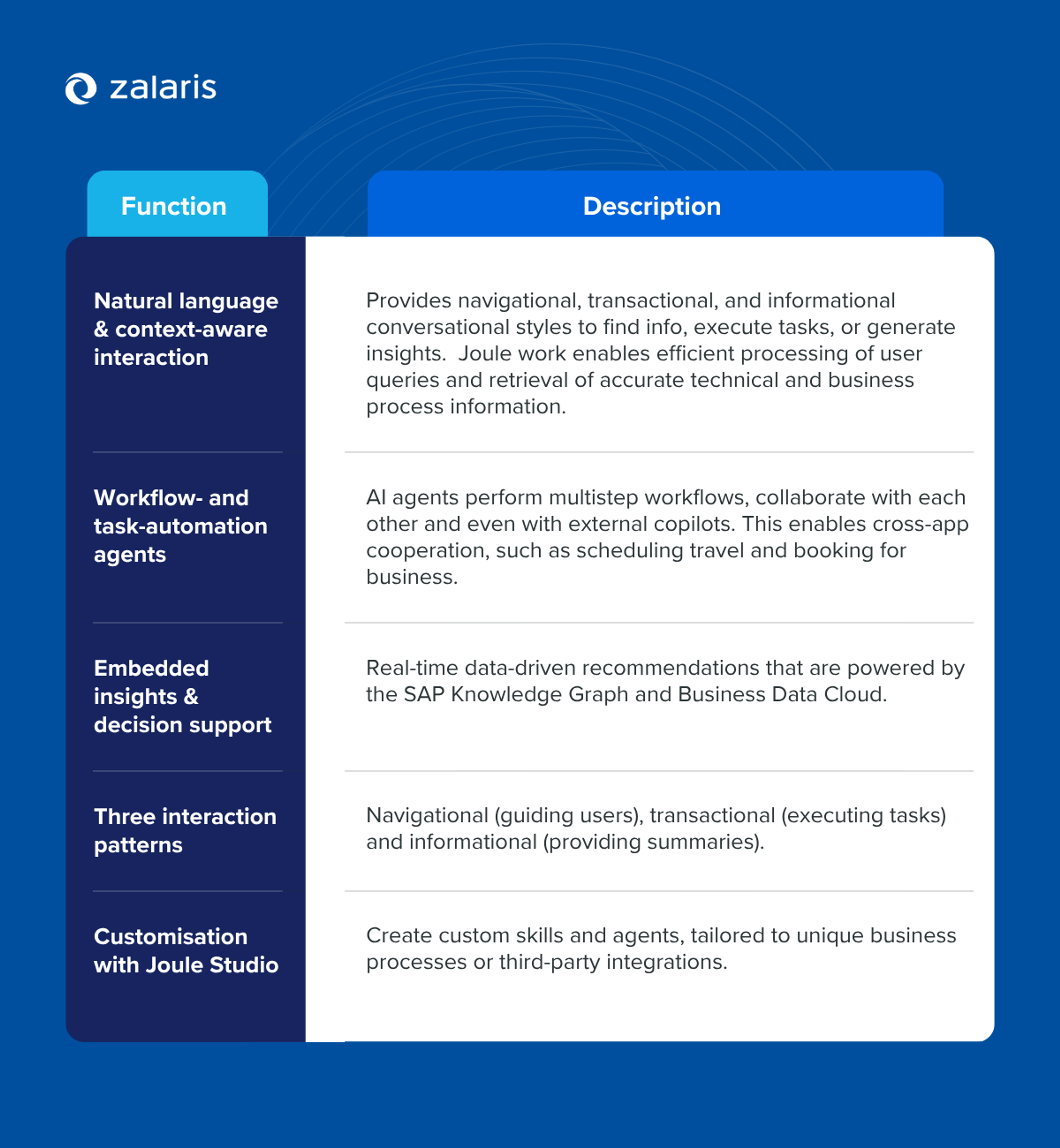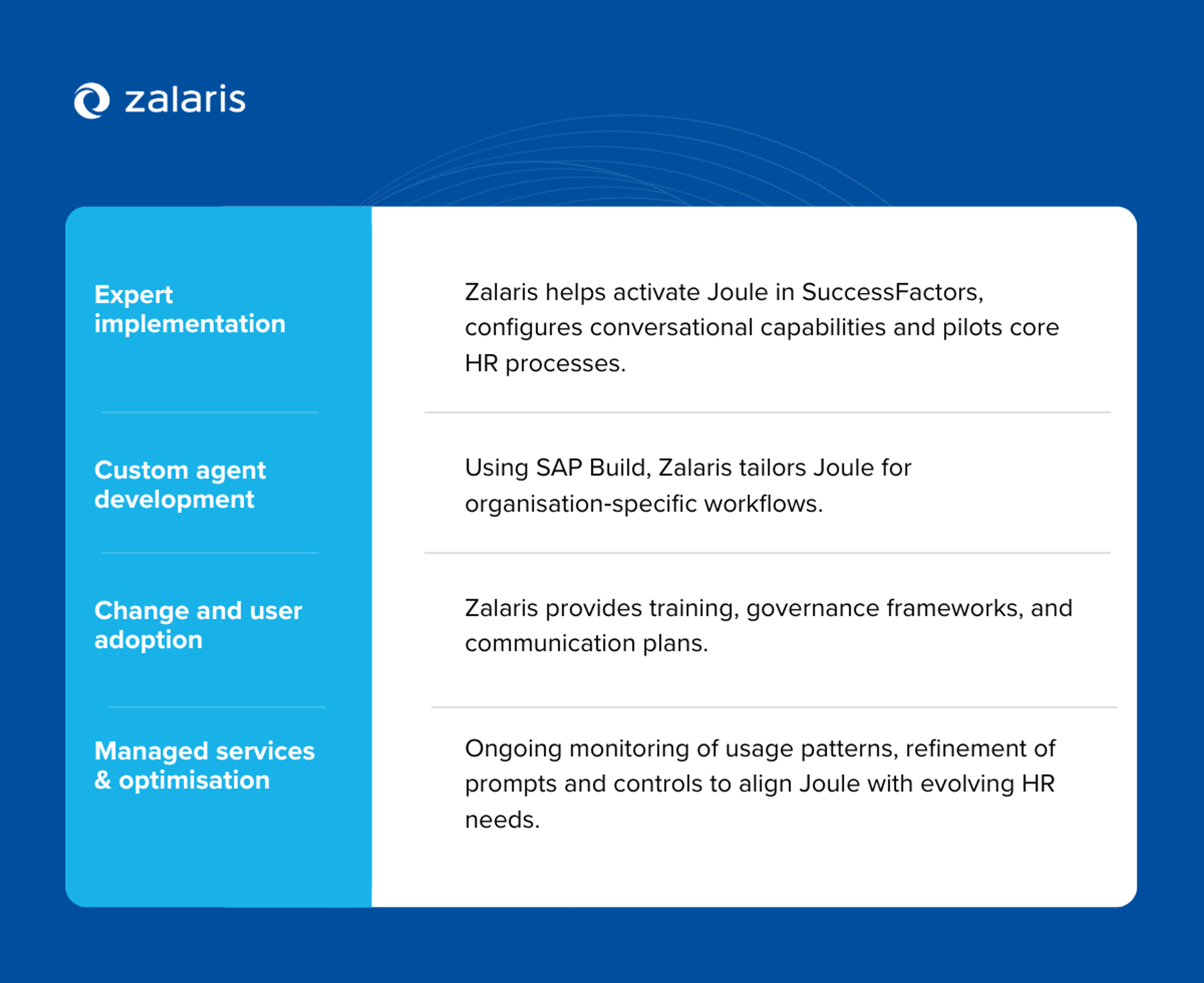Sap Joule - What you need to know about SAP’s new AI assistant
The era of generic AI-assistant and automation tools is over. SAP Joule enters the scene as a purpose-built HR tool, marking a new era in enterprise AI assistants. With unique features that ease operational HR, organisations can use it to improve productivity gains across the board. Let us have a close look at its capabilities, benefits and how to best integrate it.
Elliot Raba

SAP Joule, the next-generation generative AI assistant and AI copilot, is designed for conversational interactions across HR, finance, supply chain and more. Drawing data from SAP systems and third-party sources, Joule offers intuitive, context-rich insights, helping HR teams operate more strategically and efficiently.
What is Joule? Understanding SAP’s new AI assistant
To understand Joule better, it is worth looking at its history and how SAP turned its vision for the AI assistant into its current functionalities.
The key difference between SAP Joule and previous SAP tools like SAP CoPilot is Joule's advanced capabilities, contextual awareness, and seamless integration, which deliver real-time, actionable insights for finance teams.
Origin and vision behind SAP Joule
Announced in September 2023, Joule builds upon SAP’s Business AI strategy. SAP's vision was to empower businesses to become intelligent, efficient, and adaptable enterprises through deeply integrated and ethical AI. Joule is SAP’s response to the need for simpler, smarter enterprise software in a complex digital landscape. As a core SAP solution, Joule is designed to enhance access to business data and streamline interactions within SAP systems.
With Joule, Natural Language Processing (NLP), machine learning, and data analytics by leveraging open-source frameworks, such as TensorFlow is combined. These tools allow organisations to customise and extend Joule's capabilities. Furthermore, Joule has been designed to work seamlessly with both SAP and third-party platforms. All the while being simple enough for HR professionals to use.
SAP envisions further integration with the Internet of Things (IoT) and the introduction of advanced AI techniques to enhance responsiveness and self-adjustability.
Key functions of the SAP AI assistant
At its core, Joule is a comprehensive copilot designed to transform how employees interact with enterprise systems. The table below outlines its core functions and how each contributes to more context-aware decision-making across the organisation.

Joule makes each task simpler for users by automating processes, guiding content discovery, and enabling more intuitive navigation within SAP systems.
Comparison to other AI assistants
With a third of HR leaders planning to implement generative AI in the future, organisations are carefully considering their options. The market now offers a range of automation tools beyond the generic AI systems, including SAP Joule.
To put SAP’s AI assistant in context, it can be compared with Microsoft Copilot and Google Duet AI — each representing a different approach to AI assistance, from enterprise operations to general productivity and collaboration. The table below summarises their key differentiators:
| SAP Joule | Microsoft Copilot | Google Duet AI | |
|---|---|---|---|
| Primary Focus | Enterprise operations (ERP, HR, Supply Chain) | Office productivity (Word, Excel, Teams) | Collaboration & content creation (Google Workspace) |
| Integration Depth | Deep integration with SAP S/4HANA, SuccessFactors, etc. | Integrated with Microsoft 365 & Dynamics | Integrated with Google Workspace & Cloud |
| Natural Language Interaction | Business-context aware, supports transactions & insights | General-purpose NLP | General-purpose NLP |
| Workflow Automation | Multistep workflows via AI agents across apps | Basic automation via Power Automate | Limited workflow automation |
| Trust & Governance | Enterprise-grade compliance, transparent AI, ethical focus | Compliance & governance tools | Evolving compliance capabilities |
How SAP Joule transforms HR operations
Initially rolled out in SAP SuccessFactors and SAP Start, Joule is already making a tangible impact within HR delivery. SAP Joule helps customers accelerate time to value and improve the overall HR experience by streamlining processes and delivering faster results. It supports key processes such as recruitment, performance reviews, payroll insights, onboarding, and workforce insights. Instead of clicking through layers of menus, HR professionals can ask questions or issue commands in natural language and get results instantly.
Supporting daily HR tasks
Joule streamlines HR operations, helping professionals save time and improve efficiency. It simplifies everyday tasks and provides valuable insights at the touch of a button.
- Recruitment: Generates unbiased job descriptions and suggests interview questions based on competencies.
- Performance management: Helps write goals, feedback reports, and calibrations.
- Payroll and compliance: Identifies discrepancies, explains variances, and summarises compliance metrics.
- Document management: Enables HR professionals to efficiently retrieve, link, and manage relevant documents and business files within their workflow, ensuring seamless access to important information.
- Analytical insights: Tracks learning outcomes, succession readiness, diversity trends, and compensation alignment.
Example use cases in SAP SuccessFactors
Joule supports three distinct interaction styles that reflect how users typically engage with HR systems. These modes align with real-world scenarios and user intent. The chart below shows examples of how each interaction type functions within SuccessFactors.
| Navigational | Transactional | Informational |
|---|---|---|
| Managers can ask Joule how to create a requisition. Joule guides and even creates a draft job request. | HR can request summary feedback for a team in one command. | Ask “Who’s pending holiday requests?” and get an instant report. |
Within SuccessFactors, HR professionals simply type or speak queries. Joule either directs them to system screens or completes the task within context. No technical expertise is needed, leading to improved adoption and reduced training requirements.
Joule ensures a smooth flow of information and tasks within HR systems, enabling real-time, proactive decision-making and seamless integration across workflows.

Benefits and challenges – what to consider with SAP AI
SAP Joule offers a powerful blend of intelligence and usability, especially for non-technical users. For HR leaders, it represents a new way to engage with systems delivering faster answers, better insights, and less friction in every task. However, like any technology, it also comes with its own set of challenges.
Note: To maximise the benefits of SAP Joule, ensure that your existing systems meet the integration requirements and follow best practices for data management to support seamless operation.
Benefits of embedded SAP AI
Embedding SAP Joule into HR operations brings clear advantages:
- Faster completion of routine tasks, like drafting job descriptions or generating interview questions.
- Automating the generation of personalised feedback, multi-agent workflows, and administrative bottlenecks
- Preparing for compensation discussions with historical salary data
- Improved contextual accuracy & compliance via semantic checks and embedded policy guardrails, aligning with regulatory and internal standards
- Conversational interface to guarantee employees receive the same benefits from using AI, no matter their tech expertise.
By embedding Joule, organizations can enhance the functionality of core SAP applications, such as SAP S/4HANA and SuccessFactors, enabling deeper integration with enterprise data and more intelligent automation across HR processes.
These result in productivity gains across the board, with some studies already reporting improvements of up to 33% from the use of generative AI in HR more generally.
Challenges to watch out for
While the benefits are clear, successful AI adoption requires attention to key considerations:
- Licensing model: SAP defines “messages” per interaction; basic volume included per user, with additional charges for excess.
- Change management: Successful adoption requires HR and IT collaboration, governance, and training.
- Customisation maturity: Joule studio (no-code agent builder) is in preview; full custom agent deployment is still forthcoming.
- Data readiness and quality: Insights depend on accurate, clean data; incomplete, siloed, or inconsistent data can limit the value of AI-driven recommendations.
- Security and access governance: Joule interacts with sensitive employee data, so strict access controls and audit policies are critical.
- Building employee trust and transparency: AI-generated outputs must be communicated clearly; employees may question the fairness or relevance of AI-driven decisions.
- Integration with non-SAP systems: Integration with external HR tools (e.g., third-party learning or recruitment platforms) may require custom APIs or additional technical support.
Integrating SAP Joule into existing SAP solutions
Introducing a new AI assistant into HR operations is not just a plug-and-play upgrade. SAP Joule integrates directly with SAP business systems to streamline data access and automate HR tasks, making it easier for teams to leverage enterprise data efficiently.The real power of SAP Joule comes from how well it integrates into the broader SAP landscape, particularly with tools HR teams already rely on, like SAP SuccessFactors and S/4HANA. That seamless integration ensures that AI does not take a backseat but becomes a daily part of work life.
SAP Business Data Cloud integration
A cornerstone of SAP Joule’s power lies in its deep integration with SAP Business Data Cloud. This integration provides users with seamless access to both internal and external data, breaking down traditional data silos that often hinder business agility. By connecting SAP systems, non-SAP systems, and a variety of external data sources, SAP Business Data Cloud enables organisations to retrieve data from across their entire enterprise landscape.
With this unified approach to business data, users can make more informed decisions, whether they’re managing supply chain operations, analysing financial performance, or optimising customer experiences. The ability to access and combine data from multiple sources means that complex workflows, such as cross-departmental reporting or end-to-end process automation, can be executed with greater speed and accuracy.
SAP Business Data Cloud integration also redefines workplace productivity by automating data-driven tasks and streamlining operations. For example, HR teams can instantly pull compensation data, while supply chain managers can access real-time inventory and logistics information, all within the same environment. This seamless access to business data not only improves efficiency but also empowers users to focus on higher-value activities, driving better outcomes across the organisation.
By leveraging SAP Business Data Cloud, SAP Joule ensures that every user, regardless of their technical background, can access the right data at the right time, supporting smarter decisions and more agile business processes.
Joule Studio in SAP Build: Customising and extending Joule
Joule Studio, a key component of SAP Build, empowers organisations to tailor SAP Joule to their unique business needs. With Joule Studio, developers and business users alike can create custom AI agents, automate tasks, and design complex workflows that align with their specific processes. This flexibility allows companies to extend the capabilities of SAP Joule far beyond out-of-the-box functionality.
Through integration with SAP Build Process Automation, Joule Studio enables the automation of repetitive tasks and the orchestration of multi-step business processes. Whether it’s automating approvals, streamlining onboarding, or managing supply chain exceptions, users can create solutions that drive efficiency and reduce manual effort.
Joule Studio also offers robust tools and comprehensive documentation, making it easy for developers to get started and scale their solutions. The platform supports integration with Microsoft 365 Copilot, allowing users to access Joule’s AI capabilities directly within familiar Microsoft environments. This means employees can interact with Joule, complete tasks, and retrieve insights without leaving their core business applications.
By leveraging Joule Studio, organisations can unlock new levels of productivity, ensuring that SAP Joule adapts to their evolving needs and delivers maximum value across the SAP ecosystem.
Best‑practice strategy for integration
Implementing Joule effectively means aligning IT and HR teams, defining the right entry points, and ensuring that privacy, compliance, and usability are embedded from day one.
Implementation checklist:
- Pilot key HR use cases: Select high‑impact processes like recruitment and performance reviews.
- Governance and compliance: Engage both HR and IT teams early to manage data access, privacy, and licensing.
- Train, iterate, refine: Use adoption analytics and feedback loops to improve conversational models.
IT & HR collaboration
HR defines workflows and conversational use cases, while IT ensures security, data integration, and message‑unit management. A strategic partner like Zalaris can help to bridge the gap — from roadmap design and setup to change enablement.
SAP Joule as an opportunity for modern HR departments
SAP Joule is revolutionising HR by embedding conversational, cross-functional AI within existing workflows, simplifying recruitment, performance, compliance, and analytics. Organisational benefits include 25–30% efficiency gains, enriched decision‑making, and improved employee experiences. Zalaris offers expert help to configure, customise and scale Joule rapidly, partnering across HR and IT functions to ensure secure, compliant deployments.
How Zalaris supports HR teams in getting started with SAP Joule
Navigating emerging technology is easier with an experienced partner. Zalaris supports organisations through every stage of their SAP Joule journey, from initial planning and pilot use cases to full-scale rollout and optimisation. This ensures the assistant works not only as intended, but in a way that aligns with the organisation’s specific HR strategy and infrastructure.
Zalaris brings profound knowledge of SAP environments, practical experience in HR processes, and the tools to help HR teams make the most of this powerful new capability.

Begin a pilot now to gain an early advantage, control costs, and build momentum. Book a demo or consultation today to unlock Joule’s potential.
FAQ
- What is SAP Joule and how does it work?
SAP Joule is a generative AI assistant designed specifically for enterprise operations. It uses natural language processing to understand user queries and automate HR tasks within SAP SuccessFactors, providing conversational interactions that replace traditional menu navigation. - How does SAP Joule compare to Microsoft Copilot for HR?
Unlike Microsoft Copilot which focuses on office productivity, SAP Joule is built specifically for enterprise operations with deep integration into SAP systems. It offers business-context aware interactions and can execute complex workflows across HR, finance and supply chain functions. - What are the main benefits of implementing SAP Joule in HR departments?
SAP Joule reduces manual administrative tasks, improves data accuracy through semantic checks, and enables non-technical users to access complex HR functions through simple conversational commands. It also provides real-time analytics and automates routine processes like performance reviews and recruitment workflows. - Can SAP Joule integrate with existing HR systems?
Yes, SAP Joule integrates deeply with SAP SuccessFactors, S/4HANA Cloud, and other SAP applications. It can also connect with third-party systems through custom agents built using SAP Build, enabling cross-application workflows and data sharing. - What should organisations consider before implementing SAP Joule?
Successful implementation requires clean, well-structured data, collaboration between HR and IT teams, and comprehensive change management planning. Organisations should also establish governance frameworks and provide adequate training to ensure user adoption and maximise the system's benefits.
Related content

Elliot Raba
Enterprise Sales Executive
Elliot is a dynamic and results-driven Enterprise Sales Executive at Zalaris UK&I, where he excels in crafting innovative solutions that address the unique needs of his clients. With a keen understanding of the intricacies of enterprise level operations, Elliot leverages his extensive industry knowledge to drive business growth and foster lasting partnerships.
Table of Contents
- What is Joule? Understanding SAP’s new AI assistant
- Origin and vision behind SAP Joule
- Key functions of the SAP AI assistant
- Comparison to other AI assistants
- How SAP Joule transforms HR operations
- Supporting daily HR tasks
- Example use cases in SAP SuccessFactors
- Benefits and challenges – what to consider with SAP AI
- Benefits of embedded SAP AI
- Challenges to watch out for
- Integrating SAP Joule into existing SAP solutions
- SAP Business Data Cloud integration
- Joule Studio in SAP Build: Customising and extending Joule
- Best‑practice strategy for integration
- SAP Joule as an opportunity for modern HR departments
- How Zalaris supports HR teams in getting started with SAP Joule

